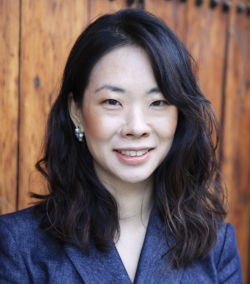Graduate School of International Studies

Five years ago, when I first came to work at Ewha, most of what I knew about Korea was from books. I was born in the United States to Korean immigrant parents and had never lived in Korea before long-term. When I told my grandfather that I had been hired to teach courses on Korean society, he found the prospect funny: “You? An American? Teach Koreans about Korea?” Initially, I brushed off his comment. What did he know about scholarship? Though my grandfather had lived through the tumultuous years of Japanese colonization, postwar poverty, and the democratization movement, I believed that scholars were uniquely trained to see the bigger picture: We look at how “invisible” structures powerfully shape our immediate circumstances. We compare social issues across time and space to show how even seemingly idiosyncratic incidents are triggered by a certain set of conditions. And as an educator, I wanted to teach Ewha students to see Korea from a theoretical perspective.
Little did I know that just a year after I was hired, I would witness students from my own university catalyze a nation-wide movement culminating in the impeachment of President Park Geun-hye. I remember walking outside of my office one afternoon in 2016, to witness what seemed like an endless horde of students holding placards and marching across the contours of our campus as they shouted in unison, “liberate (haebang) Ewha.” I was in awe. My students, even in the midst of threats from their superiors and uncertainty about their future, believed in their right to be heard. When the protests had begun earlier that year, media pundits and politicians alike had quickly dismissed the incident as mere whining. But week after week, the movement grew larger in scale and more organized in approach.
The days and weeks after I witnessed that scene outside my office, I started reflecting on my role as a professor. The course I taught every year, “Korean Society and Politics,” suddenly was imbued with more meaning. I wanted to expose my students to incidences in Korean history when social reform was instigated not by elite intellectuals or militant labor activists, but by those who were deemed powerless. Did my students know, for instance, that the student protests of the 1980s were in many ways inspired by a 22 year-old named Chun Taeil, a factory worker who ultimately put his own body on fire so that his co-workers could lead a more dignified life? Did they know about the Dongil Textile factory girls who, in the 1970s, undressed themselves during a strike to intimidate the riot police? Did they know that teenage schoolgirls helped trigger the candlelight protests of 2008, which, at its peak, attracted nearly a million people?
While scholarship gives us the tools to analyze our surroundings from an “objective” distance, our lived experiences make us care. And we need to care—we need to be emotionally affected by what we study—to ask the “right,” often inconvenient, questions. We need to care to feel an unrelenting drive to dig deeper for alternative explanations and evidence.
As I prepare to leave Ewha this summer to start a new job in the United States, I feel indebted to the students and faculty for giving me five precious years of memories, relationships, and experiences that have transformed the way that I view myself as an educator and researcher.
Even though my journey as an “Ewhain” ends here, Ewha has forever left a mark on my sense of purpose and identity as a Korean American academic, and for that, I am deeply grateful.
Sharon J. Yoon is Assistant Professor in the Department for Korean Studies in the Graduate School for International Studies. This fall, she will begin a new position as Assistant Professor for Korean Studies at the Keough School for Global Affairs at the University of Notre Dame.
Her book, The Cost of Belonging: An Ethnography of Solidarity and Mobility in the Koreatown in Beijing, will be published with Oxford University Press this November.

